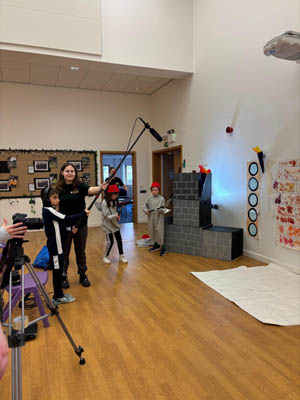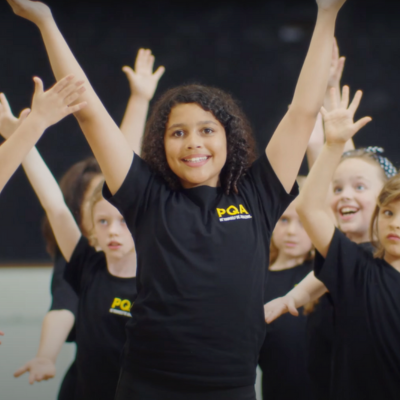Shyness is a natural trait in many children, but when it limits social and emotional growth, it’s worth finding ways to overcome it. One of the most effective tools is drama classes for kids, which combine fun with structured learning and support the development of confidence. Drama is not just about stepping onto a stage; it’s about giving children the courage to step into everyday situations with greater self-assurance. By offering creative challenges in a safe and supportive environment, drama classes can gradually transform the way a child sees themselves and interacts with the world.
In drama classes, children enter a world of imagination where they can fully express themselves. By stepping into different roles and scenarios, they experiment with emotions and behaviours without the fear of being judged. At PQA, making mistakes is part of the learning process, and our performing arts academies provide a safe, inclusive learning environment where children and young people can take on new challenges.
Fun, encouragement, and curiosity are present in every activity, making learning and developing fun. This nurturing environment allows children to let go of shyness at their own pace.
One of the most powerful ways to build confidence is through regular exposure to performance, in front of a supportive audience. Children start with small steps, such as reading lines aloud in front of their peers, and progress to acting in short scenes or taking part in group improvisations. Over time, they develop strategies to handle stage fright and begin to associate speaking up with excitement rather than fear. Every moment on in front of an audience, no matter how small, builds resilience that translates into school presentations, classroom discussions, and social interactions. The applause and positive reinforcement received after performances become strong motivators that fuel confidence far beyond the theatre.
Working as part of an ensemble teaches children that they are never alone. Much drama is built on teamwork: listening, responding, and supporting others. Shy children often find comfort in this shared responsibility, as they realise that every role no matter how small is important to the success of the whole group. Being accepted as part of a team provides them with reassurance, and seeing their peers cheer them on fosters a sense of belonging. This acceptance is particularly valuable for children who may struggle to connect in other environments, as drama at PQA provides a community that thrives on inclusivity and respect.
Drama classes at PQA are filled with playful, yet effective exercises in acting and stagecraft. Improvisation games encourage children to embrace spontaneity, listen to each other and collaborate in storytelling. Our youngest students learn key vocal skills such as projection, clarity and diction. During their time at PQA, our students progress to using voice techniques to create rounded and nuanced characters. One of the core acting skills taught at PQA is physical theatre, which encourages the use of movement to enhance storytelling. Children naturally use humour as a tool for social bonding, and at PQA we include comedy in our drama classes. Over time, even the quietest children start to get involved and find their voice.
The benefits of drama classes extend far beyond the rehearsal room. Children who once hesitated to raise their hand in class often begin volunteering answers. Those who avoided new social situations may start initiating conversations or making new friends. The discipline of learning lines and rehearsing scenes enhances memory, concentration, and focus, all valuable skills for academic success. Perhaps most importantly, the confidence gained at PQA helps children celebrate being themselves. They learn that mistakes are manageable, that they try and succeed at many things, and that their voice matters. These are lessons that shape their future.
Yes, in fact, they benefit the most. At PQA, Principals and teachers create a supportive environment where every child feels comfortable and valued. The gradual progression of activities ensures that no one is rushed or pressured beyond what they can handle.
Every child is different, and we celebrate that at PQA. Some parents may notice a change within a few weeks, especially in how children interact with peers. Over several months, parents frequently report more visible signs of confidence, such as improved communication at school and greater willingness to try new experiences.
Not at all. Our learning approach across all our drama classes is designed to nurture skills step by step. The mix of performing arts classes offered at PQA, which include Musical Theatre, Comedy & Drama and Film & Television focus on growth, enjoyment, and self-expression.
Encourage them to share what they did in class, celebrate even the smallest achievements, and attend local showcases together. Parents can also play simple drama games at home or read scripts aloud as a fun family activity, which helps children feel supported and understood.



Yes! Every academy offers one free trial session, as long as there is space available in the age group. If the group is currently full, you can join the waiting list, and we’ll contact you as soon as a place becomes available.
PQA runs for 41 weeks throughout the school year. You can find the full list of term dates on each academy’s webpage, just search for your local academy and visit its web page.
PQA provides performing arts training for children and teens aged 4–18. Our Main Academy (ages 6–18) includes three core classes:
Some academies also offer Poppets (ages 4–6), an energetic 90-minute class introducing young children to singing, dancing and acting.
PQA welcomes all children, whether they’re complete beginners or already confident performers. There’s no audition needed to join.
At PQA students in Main Academy are grouped by age, learning with other children and young people at similar stages.
This depends on where you feel your child will be happiest. Some 6-year olds are ready to join the 6-9 age group in Main Academy, others will feel more comfortable starting in Poppets.
Your always welcome to discuss what’s best for your child with your local Principal before booking your free session.